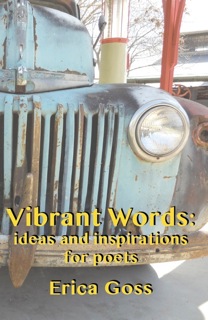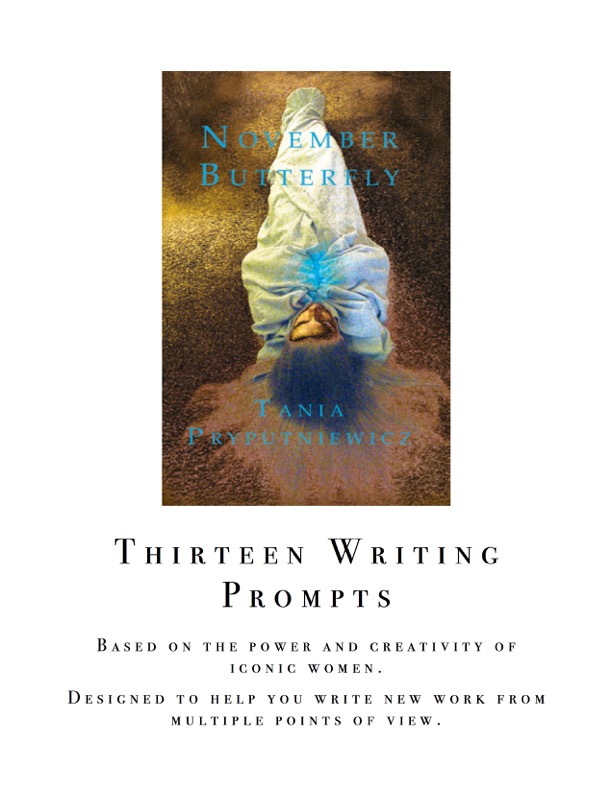 Erica Goss writes a video poetry column, The Third Form, for Connotation Press (something I discovered not too long ago when I was foraging for video poetry sites). Her new book, Vibrant Words: Ideas and Inspirations for Poets, is a collection of writing prompts that wrote itself in part online, prompt by prompt, on a Facebook page. Here’s the story of the book’s genesis, a look at the advantages of working with a small press, and an excerpt from a chapter titled, “Fairy Tales.”
Erica Goss writes a video poetry column, The Third Form, for Connotation Press (something I discovered not too long ago when I was foraging for video poetry sites). Her new book, Vibrant Words: Ideas and Inspirations for Poets, is a collection of writing prompts that wrote itself in part online, prompt by prompt, on a Facebook page. Here’s the story of the book’s genesis, a look at the advantages of working with a small press, and an excerpt from a chapter titled, “Fairy Tales.”
When I became Poet Laureate of Los Gatos, a small town in Northern California’s Silicon Valley, I began posting poetry writing prompts every Friday on the Los Gatos Poet Laureate Facebook page. Some were more successful than others – for example, my prompt to “write a poem in the voice of someone twice your age” elicited wry comments from individuals who stated that they would be writing in the voice of an extremely aged person of, perhaps, one hundred and twenty.
For the most part I’ve received positive feedback from the online poetry community. Several people suggested that I collect the prompts into a book. I had vague ideas of self-publishing an ebook, or just creating a PDF and sending it to whomever asked, until fate intervened at a book launch party in late 2013. I met the publishing team of Jan McCutcheon and Spike Wong, a.k.a. Pushpen Press, who had just published their first book. After a conversation with Spike, and future meetings with Jan, we had a book deal. The result, Vibrant Words: Ideas and Inspirations for Poets, appeared in late March of this year, lightening speed in the publishing world.
Working with Jan and Spike was a pleasure from start to finish. I had instant access to both of them, from the first rough draft to creating a marketing plan. As a small press, they were involved on a personal level that’s just not possible with a big publishing firm. We made all decisions together, and continue to work as a team on promoting the book. I was fortunate indeed to meet them at the party in 2013.
Enjoy the following excerpt, adapted from the chapter “Fairy Tales.”
In 2005, I visited the Märchenwald (Fairy tale forest) in Altenberg, Germany. What a gently peculiar place it was, in a mysterious green park of tall trees hung with moss. Here you can view mechanical puppets of Snow White and the Seven Dwarves in a tiny cabin, complete with seven miniature beds, or push a button and watch Rapunzul’s golden hair erupt from a stone tower. Everything is child-sized, including a special section of the restaurant just outside the park. It’s rumored that Walt Disney visited this Märchenwald, looking for ideas for Disneyland.
Something I noticed about Märchenwald was that the frightening elements of the Grimm fairy tales – giant crows, wolves, and evil queens – were not removed from the little houses and displays. Good and evil stood side-by-side. The balance between light and dark struck me, unlike the artificial perfection of Disneyland.
The best poems are a balance between light and dark. They don’t dwell in either, but include the full range of human experience. Snow White must eat the poisoned apple, and the wolf will devour Red Riding Hood. These archetypes can be fertile ground for poems.
Classic stories, told over and over, help us understand the world and our place in it. Poets often make use of fairy tales for the basis of their work; Anne Sexton’s Transformations is a book of poems based on Grimm’s fairy tales. In the forward, Kurt Vonnegut, Jr. writes, “(Sexton) domesticates my terror, examines it and describes it, teaches it some tricks which will amuse me, then lets it gallop wild in my forest once more.”
One of my favorite fairy tales as a child was “The White Bear,” also known as “East of the Sun and West of the Moon,” in which a young girl, sold by her parents to an enchanted prince, loses him and then rescues him from an evil fairy. My poem, “The White Bear,” is based on that story:
The White Bear
A man came and lay down beside her, and behold it was the White Bear,
who cast off the form of a beast during the night.
– The Blue Fairy Book
Too young for regrets or suspicion
I climbed his thick body
watched one paw lap over the other
claws tilted inward as I held on
and we swayed down the road.
Back home mama and the children
stared at the dirt floor. Papa counted
pieces of gold.
I walked away from my childhood,
little breasts a surprise on my chest.
What would love be like?
Mama and papa: rustling, a groan.
Seven children among the dented pots.
Each night I put out the light. Only then
did he come to me, pull back the furs
and slide his hands up my arms,
the hands of a prince:
calloused from the sword
and the grip of his fingertips.
Our bed burned those Nordic nights.
Days were empty and twilit. Still a child
I listened for his breathing, tilted the candle
over his noble head. Now
I go begging from door to door
looking for him in cities, in men’s faces
our pale baby strapped to my back
her hair like the snow
that piled up outside the long hall
corners dwindled
and dark with enchantment.
First published in The Bohemian Journal, Fall 2012
Vibrant Words: Ideas and Inspirations for Poets is available from Amazon: http://www.amazon.com/Vibrant-Words-Ideas-Inspirations-Poets/dp/0989667634/ref=sr_1_1?ie=UTF8&qid=1396885012&sr=8-1&keywords=vibrant+words
Erica Goss is the Poet Laureate of Los Gatos, CA, and the host of Word to Word, a show about poetry. She is the author of Wild Place (Finishing Line Press 2012) and Vibrant Words: Ideas and Inspirations for Poets (PushPen Press 2014). Her poems, reviews and articles appear widely, both on-line and in print. She won the 2011 Many Mountains Moving Poetry Contest and was nominated for the Pushcart Prize in 2010 and 2013. Please visit her at: www.ericagoss.com.




